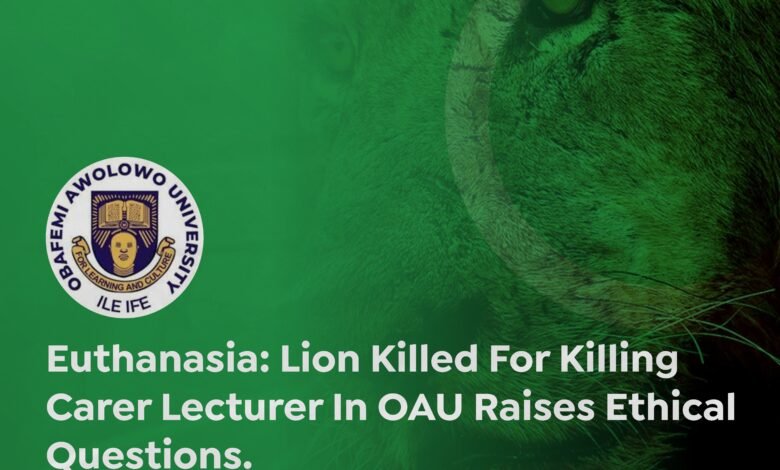Euthanasia: Lion killed for Killing Carer Lcturer in OAU Raises Ethical Questions

The tragic incident at Obafemi Awolowo University, OAU, where a lion killed its carer, a lecturer at the university, has sparked a complex debate over animal rights and zoo management practices in Nigeria. Following the incident, the lion was euthanized, a decision that has raised questions about the ethical considerations in handling such situations and the broader state of wildlife management in the country.
Zoo management in Nigeria, as in many parts of the world, is governed by a set of standards and practices designed to ensure the safety of both humans and animals. These standards include proper enclosures, adequate nutrition, healthcare, and environmental enrichment for the animals. However, the effectiveness of these practices can vary widely, with some facilities able to maintain high standards, while others may struggle due to financial, logistical, or educational constraints.
The decision to euthanize an animal following an attack on a human is always contentious and is generally considered a last resort. The rationale behind such a decision often includes the perceived threat the animal might continue to pose, the potential for rabies in cases involving certain species, and a concern for public safety.
Meanwhile, animal rights advocates argue that euthanizing animals for behaving according to their instincts, especially when those instincts are triggered by potentially inadequate living conditions or human error, is unjust and highlights failures in zoo management and wildlife conservation efforts.
This incident sheds light on the broader state of wildlife conservation in Nigeria, which faces challenges including habitat destruction, poaching, and a lack of funding for conservation initiatives. While there are efforts underway to protect Nigeria’s diverse wildlife, the effectiveness of these initiatives is hampered by limited resources and the complex socio-economic realities of the country.
Analyzing the euthanization of the lion in the context of animal rights raises critical ethical questions. It prompts a reassessment of how animals are housed, cared for, and interacted with in captive settings.
This tragedy underscores the urgent need for improved standards in zoo management and wildlife conservation in Nigeria. It calls for a balanced approach that considers the well-being of animals, the safety of humans, and the ethical implications of our choices.
While the euthanization of the lion at OAU may be seen by some as a necessary action under the circumstances, it highlights significant issues in the management of captive wildlife and the state of animal rights in Nigeria. This incident should serve as a catalyst for dialogue and action towards better practices in zoo management and wildlife conservation, ensuring such tragedies are avoided in the future.





